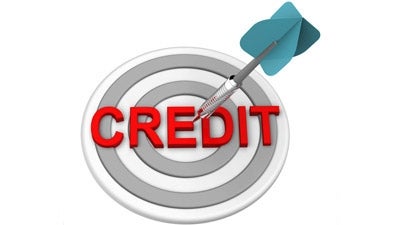
If you are in the start-up phase of owning a small business, give yourself some credit because it’s unlikely anyone else will.
Small businesses have an extremely difficult time getting credit from the one place they really want it: lending institutions. Lenders are notorious for turning their backs when approached for a loan because 25 percent of startups fail in the first year and nearly 50 percent are gone by the third year.
Coincidentally, three years is the typical time period that it takes to establish a business credit score, which is what the banks are looking at before they loan any money. In the meantime, you might have to rely on loans from family and friends or cash in IRAs or annuities, just to keep things afloat while you build up your business credit score.
The building process for a good business credit score is very much like building a personal credit score. There are steps you can take to try and speed the process, or at least keep it on track, but the key is to spend the time and be diligent about the process. Unfortunately, time and diligence may be in short supply with start-ups.
Here are some of the steps a small business owner must take to earn a good credit score:
- Separate your business from your personal life. The most fundamental way to build a business credit score is to take the business out of your name. Incorporate as soon as possible. Too many small business owners rely on their personal credit history to carry their business. Bad move. Banks are more comfortable making loans to businesses than individuals, often lending the business 10 times more than they would an individual.
- Apply for a business credit card. Even if it has a low spending limit, a business credit card is the gateway to a good credit score. Use it for every purchase possible, up to the credit limit, and pay it off every month. Follow those two steps religiously, and your credit limit should rise dramatically over a short period of time. So will your credit score.
- Never mix business and personal expenditures. This commonsense rule is violated a shocking amount of time. A Small Business Administration report showed that 65 percent of business owners used credit cards for purchases, but only half of those owners used a credit card in the business name. It is extremely difficult to build up a business credit score if you’re going to use your personal business card.
- Establish a line of credit with suppliers and vendors. Ask for 30-day terms from as many businesses as you can. It does pay to shop around for prices, but if possible, use vendors and suppliers that will give you terms and report purchases to one of the major credit-rating services like Dun & Bradstreet, Experian and Equifax. If the people you’re buying from don’t report your purchases to the credit-rating companies, then your business score suffers.
- Pay your bills on time. All things considered, this may be the single most important factor in establishing a good credit score. On-time payment accounts for one-third of your overall credit score. That makes it imperative that you pay on time, even if it means taking drastic steps like selling an annuity. The good news is that if you pay your suppliers, credit cards, rent, etc., on time, the banks can easily be persuaded that you will pay back a loan on time, too.
- Check your credit report. This is often overlooked, but very necessary. It doesn’t cost anything to get a credit report once a year from each of the rating agencies. Hire an accountant to audit the report if you have to, but be certain there are no mistakes. A good credit report not only makes you a more attractive borrower, it can improve the terms that you borrow under.
It should not take much time to implement these suggestions. If you’re successful, it’s possible the banks will provide a loan to grow your business at the time when you actually need it .
And nothing feels better than getting credit from a bank.
This article was originally published by Outright.com
Published: November 11, 2013
6023 Views
6023 Views












